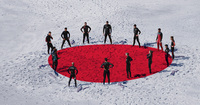How to Develop a Vision
Four steps towards imagination

"What's your vision for this?"
Have you been asked this question? Did you freeze not knowing what it should be? Maybe you thought "How on earth does a vision emerge? I'm not a visionary, I'll just on execution."
Bullshit. That's what you may have been told, but that's it's not true.
A vision is critical for any undertaking. It keeps a team working together, in alignment. It rallies people in the face of adversity. It makes those blurry, far-away goals feel crisp and tangible. It fills in for data when you don't have any, and still need to make complicated or ambiguous decisions.
But where does it come from? The mind's eye? No, it comes from data; over and over I've seen a path for most people to develop a vision.
In a nutshell, it goes like this:
Data accumulates as Experience leading to an Opinion which unlocks a Vision
You can't skip any of these steps, or your vision will fail. It will incomplete, uninspiring or unattainable.
Data
It all starts with individual data points.
First, you need to be exposed to lots and lots of isolated anecdotes, quotes, stories, events and stats about the subject matter you're working on. You can't just think about it, you need to get out there and bathe in information of all sorts.
At first, they're loose, floating in the weightless ether of a newbie's brain. Think of how, when learning a new language, you only hear random sounds and try to memorize what they mean. The whole doesn't yet make sense.
And over time, you start to see some patterns. You realize that people may describe the same thing in different ways. So instead of keeping all of those data points in isolation, you start to group them, to correlate them. As you learn new data points, you know where to file them. you develop the ability to recognize and reflect on new learnings.
In other words, you develop experience.
Experience
Experience is the traffic cop in your gut who lets to know what to follow and what to ignore.
It turns loose learnings into cohesive threads. It unlocks the possibility of focus, since you're not overwhelmed with new information anymore. It rounds edges and coalesces the shape of knowledge.
Beyond that, experiences build on each other. The neurons you've been dedicating to learning whatever it is you're learning start to have fun, unplanned meetings with other neurons, ones holding unrelated information, and new possibilities emerge.
And over time, the sum experiences give you confidence to think, more subjectively, more instinctively. Your brain can shortcut through the thousands of data points you collected, filter them through experience and say: "hey, this is a promising solution, that is not."
In other words, you develop an opinion.
Opinion
Opinions are unapologetically subjective but if you think about it, when derived from experience, they're actually supported by lots of objective data.
They are critical because for so many projects, from the most intellectual to the most manual, from the artistic to the scientific, making things is never deterministic. You never enough data – and never ever enough time – to make fully data-based decisions. So you need to rely on your judgment to evaluate solutions. And then jump in, dedicating resources, time, money towards the best bets.
And over time, you become more attuned to your opinions. You begin to throw some away and develop new ones. You gain the ability to tease your opinions apart and understand where they are coming from.
And they evolve from being mostly reactions to your environment – about what you hear, see, read, learn – and start to move towards possibilities – about what things should be like. You develop an idea of the direction things should go, of how they could be different, even if no one has gone there yet.
In other words: you arrive at a vision.
There you go
This progression is why some people who have worked for a long time in an industry can imagine a completely different world. Why designing a product or process to be used by people like yourself is easier than designing for people who are different.
The key ingredients for the process are time and thoughtfulness. You can compensate for time with intensity, by exposing to as much learning as you can, if you're diligent enough about processing your learnings.
But in my experience, there's a limit to how much you can compress time. Maybe our brains evolve to operate at a certain natural pace. Maybe it's the cross-pollination between work and life experiences.
What really matters is that people aren't born with a grand vision. So you should not divide the world between the visionaries and the rest. Like so many skills, the development of a vision can be learned and developed. Even if, like so many skills, it clearly comes more naturally to some than to others.
But it also means you can hire people who can develop a vision that goes much beyond what you already have. It means anyone can develop a vision for their slice of the world, be it how an industry changes, how a product evolves, how a team shapes up, how a community changes.
So remember. Data to Experience to Opinion to Vision.
The key is to live, and learn, with intention.
